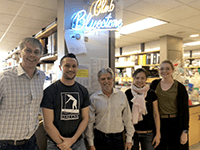Antigen Specificity of Regulatory T-Cells in T1D

Research Area
Diabetes
Grant Type
Network
Year
2015
Abstract
Type 1 diabetes is an autoimmune disease which is caused by a breakdown in immune tolerance to the insulin-producing pancreatic islets. A key cell population that becomes defective in the evolution of this disease are T cells. Islet-specific T cells help orchestrate the ultimate destruction of pancreatic islets and thus understanding how these cells arise and are controlled are key to unraveling type 1 diabetes. These T cells arise in the thymus which is a selecting immune organ that normally prevents the generation of these cells or converts them into cells that control self-reactive T cells called Tregulatory cells (Treg’s). Within the pancreatic islet Treg’s and self-reactive T cells are thought to be in balance and is another layer that helps prevent type 1 diabetes. This network grant brings together three immunology lab teams that will focus on this problem: Anderson, Bluestone, and Garcia. The Anderson group will focus on how the thymus selects these T cells. The Bluestone group will study the Treg populations that help control type 1 diabetes. The Garcia team will be involved in studying the structure of T cell receptors from these T cells to help further understand the properties of these T cell populations. These studies will not only help unravel how type 1 diabetes occurs, but will also open new avenues for the potential treatment and/or prevention of the disease.

